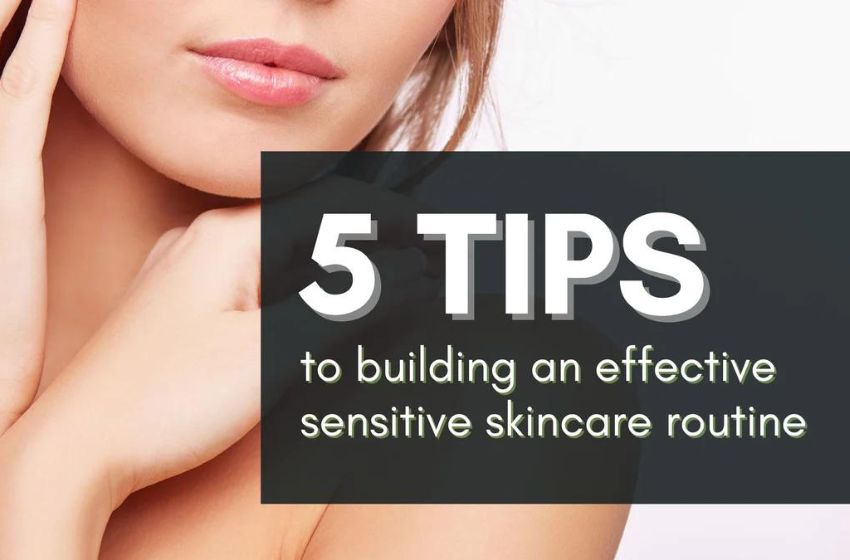Welcome to the ultimate guide for all those with sensitive skin! If you’ve ever experienced redness, irritation, or breakouts after using skincare products, this post is here to your rescue. We understand that finding the right products and routines can be a daunting task when you have sensitive skin. But worry not! In this comprehensive guide, we’ve gathered five game-changing skincare tips that will help you achieve a healthy and radiant complexion without any unwanted reactions. So get ready to bid adieu to sensitivity woes and say hello to a glowing, happy face – let’s dive in!

Introduction to Sensitive Skin
Sensitive skin is a common condition that affects many individuals, causing discomfort and irritation in response to certain skincare products or environmental factors. It is characterized by a heightened reaction to external triggers, leading to redness, inflammation, dryness, and overall discomfort.
There are various factors that can contribute to sensitive skin, such as genetics, allergies, underlying health conditions, and harsh chemicals in skincare products. People with sensitive skin often experience discomfort when using regular beauty products due to their delicate skin barrier being easily compromised.
Sensitive skin can also be triggered by environmental factors such as changes in weather or pollution levels. These external triggers can cause the skin's protective barrier to weaken and become more susceptible to irritants.
- Avoid Harsh Ingredients and Fragrances
Sensitive skin can be a challenge to manage, as it tends to react easily to various environmental and chemical triggers. One of the most important steps in caring for sensitive skin is avoiding harsh ingredients and fragrances in your skincare routine. These can cause irritation, redness, and discomfort, making it essential to choose products that are gentle and suitable for delicate skin.
1. Understanding Harsh Ingredients: Harsh ingredients refer to chemicals or substances that have the potential to irritate or damage the skin's natural barrier. This barrier is responsible for protecting the skin from external aggressors such as pollution, UV rays, and bacteria. When this barrier is compromised, sensitive skin becomes more vulnerable and prone to reactions.
Some common harsh ingredients found in skincare products include sulfates, alcohol, parabens, artificial fragrances/dyes/colorants, and preservatives like formaldehyde-releasing agents.
It is crucial to carefully read the labels of skincare products before purchasing them to avoid these potentially harmful ingredients.
2. The Dangers of Fragrances: Fragrances may make a product smell nice but can be extremely harmful for sensitive skin. They are often made up of hundreds of different chemicals that can trigger allergic reactions or irritation on the skin. Fragrance-free or unscented products may be a better option for those with sensitive skin.
Many people also confuse natural fragrances with synthetic ones; however, even natural scents derived from essential oils can cause sensitivity in some individuals.
- Use Gentle Cleansers and Moisturizers
When it comes to caring for sensitive skin, the most important aspect is choosing the right products. This means avoiding harsh chemicals and opting for gentle cleansers and moisturizers that will nourish and protect your delicate skin.
1. Look for Fragrance-Free Products: Fragrances can be a common irritant for those with sensitive skin, so it's best to avoid them altogether. Instead, opt for products that are labeled as "fragrance-free" or "unscented."
2. Choose Mild Cleansers: Harsh cleansers can strip the skin of its natural oils, leaving it feeling dry and irritated. Look for mild, non-foaming cleansers that are specifically formulated for sensitive skin. These will gently cleanse without disrupting the skin barrier.
3. Avoid Exfoliants: While exfoliating can be beneficial for some skin types, it's not recommended for those with sensitive skin. The abrasive particles in exfoliants can cause micro-tears in the delicate surface of the skin, leading to irritation and inflammation.
- Always Patch Test New Products
One of the most important things to remember when trying out new skincare products for sensitive skin is to always patch test first. This step should never be skipped, as it can help prevent potential allergic reactions or irritations.
Patch testing involves applying a small amount of the product onto a small area of your skin and monitoring it for any adverse reactions. This allows you to see how your skin will react to the product before using it all over your face.
Here are some steps to follow when conducting a patch test:
1. Start with clean skin: Make sure the area where you will be conducting the patch test is free of any other skincare products or residue.
2. Choose a small area: Pick a spot on your inner forearm, behind your ear, or on your neck where the skin is relatively thin and sensitive.
3. Apply a small amount: Using a cotton swab or clean fingers, apply a small amount of the product onto the chosen area.
- Protect Your Skin from the Sun
One of the most important aspects of a sensitive skin care routine is protecting your skin from the sun's harmful rays. Exposure to UV radiation can lead to a multitude of issues, including premature aging, dark spots, and even skin cancer. This is why it is crucial to make sun protection a priority in your skincare routine.
Here are some tips on how you can effectively protect your sensitive skin from the sun:
1.1 Wear sunscreen daily: Sunscreen should be an essential part of your everyday skincare routine, regardless of weather or season. Look for a broad-spectrum sunscreen with SPF 30 or higher that offers protection against both UVA and UVB rays. It should also be labeled as "non-comedogenic" and "fragrance-free" to avoid any irritation or clogging of pores.
1.2 Reapply every two hours: It is vital to reapply sunscreen every two hours, especially if you are spending extended periods outdoors or participating in activities that cause sweating or water exposure.
1.3 Seek shade: Avoid direct sunlight during peak hours between 10 am and 4 pm when UV rays are strongest. If possible, seek out shady areas or bring an umbrella when spending time outside.

- Develop a Consistent Skincare Routine
Developing a consistent skincare routine is crucial for maintaining healthy and glowing skin, especially for those with sensitive skin. Sensitive skin requires extra care and attention to avoid any irritation or reactions. In this section, we will discuss step by step how to develop an effective and consistent skincare routine for sensitive skin.
1. Determine Your Skin Type: The first step in developing a consistent skincare routine is understanding your skin type. Sensitive skin can be dry, oily, combination, or acne-prone, so it's essential to know which category your skin falls under. This knowledge will help you choose the right products suitable for your skin type.
2. Choose Gentle Cleansers: Cleansing is the most crucial step in any skincare routine as it removes dirt, oil, and impurities from the surface of the skin. For sensitive skin types, it's essential to choose gentle cleansers that are free from harsh chemicals like sulfates and fragrances as they can cause irritation. Look for cleansers labeled "for sensitive skin" or "fragrance-free."
Conclusion
Taking care of sensitive skin can be a challenging task, but with these 5 tips, you can achieve healthy and glowing skin. Remember to always patch test new products before using them on your face, keep your skincare routine simple and gentle, avoid harsh ingredients and fragrances, protect your skin from sun damage, and listen to what your skin is telling you. With patience and consistency, you can find the perfect routine for your sensitive skin that will leave it looking radiant and feeling nourished. So embrace these tips and say hello to a happier complexion!



